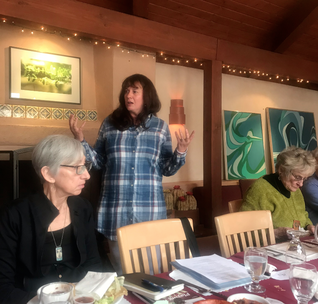|
Here are Carolyn’s notes from her talk:
Using a ghostwriter used to be considered a dirty secret, the kind that could ruin an author’s career if it got out. Not anymore! Now we know that there are many good and practical reasons for an author to seek a ghost’s help. In fact, Madeline Morel, a respected agent for professional ghosts, estimated in a 2014 interview that 60% of the nonfiction titles on the bestseller lists of that year had been written by ghosts. There’s no reason to think that’s changed. First, it’s important to get a few definitions straight:
To understand what a ghost does, it’s important to be clear what a professional ghost is not. We are not co-authors who work collectively to develop the ideas and own them jointly. We are not author substitutes who create ideas, put them in readable form, and let someone else take the credit in exchange for cash. And we are not student or scholar stand-ins who do other people’s homework for them. So who uses ghostwriters? Many people! The first and most obvious are VIPs—celebrities, politicians, corporate titans, and the like. They’re incredibly busy and their time is precious, so it has always been considered acceptable for them to hire professional help in writing a book. But they are no longer the only ones. First, anyone who lacks TIME can benefit from a ghost. That can be defined a number of different ways. Busy professionals who are running an organization or managing a successful career often don’t have enough time to pen a book, but need one to get to the next professional level. Famous authors who are too busy to keep up with demand do so, too. Guys like Tom Clancy simply can’t produce enough new work per year to keep up with their fan’s appetites or their publishers’ demands, so they bring in ghosts. Some, like Clancy, have also figured out that their name is their best brand asset. So they lend it to books though they have no hand in writing, in exchange for a princely sum. And of course, when an author dies, that’s the ultimate way to run out of time. The estates of famous authors like V.C. Andrews and Robert Ludlum have brought in ghosts to complete manuscripts based on any notes, scribblings, or other materials an author leaves behind when they pass. Second, a lack of expertise can motivate someone to seek a ghost’s help. As Madeline Morel says, “Celebrities sell books but they can’t necessarily write them.” Becoming an expert in any given subject takes enough time and effort; it may not be practical to become an expert on writing, too. A raconteur such as Alexandre Dumas may have good ideas, a popular following, and great skill at self-promotion. If he doesn’t have a way with words, he hires a shy fellow like Auguste Maquet to do the heavy lifting on manuscripts like The Count of Monte Cristo. Other professionals may struggle with writing, or simply may not like it. They can still share their wisdom and experience by telling their stories to someone who loves putting the pieces together. And I’ve worked with many people whose lack of confidence or organizational skill amounted to a paralyzing case of writer’s block. For them, working with a professional like me was the key to making their book dreams a reality. Last, there are the “book profiteers,” those who monetize books as products to make a profit in a market niche they have identified. Remember all of those Nancy Drew mysteries that teen readers devoured for decades? Their author, Carolyn Keene, does not exist. The manuscripts were written by a whole stable of ghosts hired by a publishing company who saw the opportunity in a plucky girl detective. And, of course, there have been rumors in the publishing industry for a decade that famous Goosebumps magnate R.L. Stine brings in some hired guns (though he denies this vehemently). Maybe he really does turn out two books a month...every month...every year. Who is to say? So how do professional ghosts make a living? Most of us find clients through word of mouth. Yes, we advertise, maintain websites and social media, and network. But because we tend to operate behind the scenes (and often cannot talk about our past projects due to NDA clauses), we rely on endorsement from happy authors. When we talk to potential clients, the first thing we do is assess whether the relationship is the right fit. After all, you’re going to be working very closely and intimately for several months. After that, the process tends to go as follows:
0 Comments
Your comment will be posted after it is approved.
Leave a Reply. |
About
NMBA News, Opinion, and Articles are powered by members. To submit, please email your materials to [email protected] Archives
July 2024
Categories
All
|


 RSS Feed
RSS Feed
